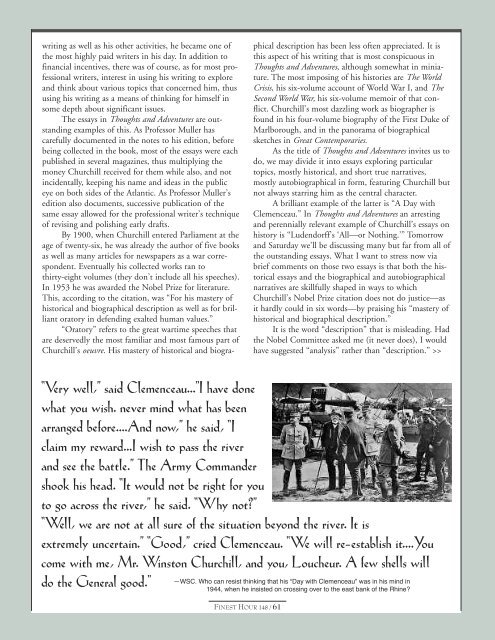You also want an ePaper? Increase the reach of your titles
YUMPU automatically turns print PDFs into web optimized ePapers that Google loves.
writing as well as his other activities, he became one of<br />
the most highly paid writers in his day. In addition to<br />
financial incentives, there was of course, as for most professional<br />
writers, interest in using his writing to explore<br />
and think about various topics that concerned him, thus<br />
using his writing as a means of thinking for himself in<br />
some depth about significant issues.<br />
The essays in Thoughts and Adventures are outstanding<br />
examples of this. As Professor Muller has<br />
carefully documented in the notes to his edition, before<br />
being collected in the book, most of the essays were each<br />
published in several magazines, thus multiplying the<br />
money <strong>Churchill</strong> received for them while also, and not<br />
incidentally, keeping his name and ideas in the public<br />
eye on both sides of the Atlantic. As Professor Muller’s<br />
edition also documents, successive publication of the<br />
same essay allowed for the professional writer’s technique<br />
of revising and polishing early drafts.<br />
By 1900, when <strong>Churchill</strong> entered Parliament at the<br />
age of twenty-six, he was already the author of five books<br />
as well as many articles for newspapers as a war correspondent.<br />
Eventually his collected works ran to<br />
thirty-eight volumes (they don’t include all his speeches).<br />
In 1953 he was awarded the Nobel Prize for literature.<br />
This, according to the citation, was “For his mastery of<br />
historical and biographical description as well as for brilliant<br />
oratory in defending exalted human values.”<br />
“Oratory” refers to the great wartime speeches that<br />
are deservedly the most familiar and most famous part of<br />
<strong>Churchill</strong>’s oeuvre. His mastery of historical and biographical<br />
description has been less often appreciated. It is<br />
this aspect of his writing that is most conspicuous in<br />
Thoughts and Adventures, although somewhat in miniature.<br />
The most imposing of his histories are The World<br />
Crisis, his six-volume account of World War I, and The<br />
Second World War, his six-volume memoir of that conflict.<br />
<strong>Churchill</strong>’s most dazzling work as biographer is<br />
found in his four-volume biography of the First Duke of<br />
Marlborough, and in the panorama of biographical<br />
sketches in Great Contemporaries.<br />
As the title of Thoughts and Adventures invites us to<br />
do, we may divide it into essays exploring particular<br />
topics, mostly historical, and short true narratives,<br />
mostly autobiographical in form, featuring <strong>Churchill</strong> but<br />
not always starring him as the central character.<br />
A brilliant example of the latter is “A Day with<br />
Clemenceau.” In Thoughts and Adventures an arresting<br />
and perennially relevant example of <strong>Churchill</strong>’s essays on<br />
history is “Ludendorff’s ‘All—or Nothing.’” Tomorrow<br />
and Saturday we’ll be discussing many but far from all of<br />
the outstanding essays. What I want to stress now via<br />
brief comments on those two essays is that both the historical<br />
essays and the biographical and autobiographical<br />
narratives are skillfully shaped in ways to which<br />
<strong>Churchill</strong>’s Nobel Prize citation does not do justice—as<br />
it hardly could in six words—by praising his “mastery of<br />
historical and biographical description.”<br />
It is the word “description” that is misleading. Had<br />
the Nobel Committee asked me (it never does), I would<br />
have suggested “analysis” rather than “description.” >><br />
“Very well,” said Clemenceau...”I have done<br />
what you wish. never mind what has been<br />
arranged before....And now,” he said, “I<br />
claim my reward...I wish to pass the river<br />
and see the battle.” The Army Commander<br />
shook his head. “It would not be right for you<br />
to go across the river,” he said. “Why not”<br />
“Well, we are not at all sure of the situation beyond the river. It is<br />
extremely uncertain.” “Good,” cried Clemenceau. “We will re-establish it....You<br />
come with me, Mr. <strong>Winston</strong> <strong>Churchill</strong>, and you, Loucheur. A few shells will<br />
do the General good.”<br />
—WSC. Who can resist thinking that his “Day with Clemenceau” was in his mind in<br />
1944, when he insisted on crossing over to the east bank of the Rhine<br />
FINEST HOUR 148 / 61

















